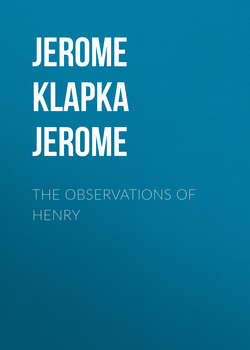Читать книгу The Observations of Henry - Jerome Klapka Jerome, Джером Джером - Страница 2
THE USES AND ABUSES OF JOSEPH
ОглавлениеIt is just the same with what you may call the human joints,” observed Henry. He was in one of his philosophic moods that evening. “It all depends upon the cooking. I never see a youngster hanging up in the refrigerator, as one may put it, but I says to myself: ‘Now I wonder what the cook is going to make of you! Will you be minced and devilled and fricasseed till you are all sauce and no meat? Will you be hammered tender and grilled over a slow fire till you are a blessing to mankind? Or will you be spoilt in the boiling, and come out a stringy rag, an immediate curse, and a permanent injury to those who have got to swallow you?’
“There was a youngster I knew in my old coffee-shop days,” continued Henry, “that in the end came to be eaten by cannibals. At least, so the newspapers said. Speaking for myself, I never believed the report: he wasn’t that sort. If anybody was eaten, it was more likely the cannibal. But that is neither here nor there. What I am thinking of is what happened before he and the cannibals ever got nigh to one another. He was fourteen when I first set eyes on him – Mile End fourteen, that is; which is the same, I take it, as City eighteen and West End five-and-twenty – and he was smart for his age into the bargain: a trifle too smart as a matter of fact. He always came into the shop at the same time – half-past two; he always sat in the seat next the window; and three days out of six, he would order the same dinner: a fourpenny beef-steak pudding – we called it beef-steak, and, for all practical purposes, it was beef-steak – a penny plate of potatoes, and a penny slice of roly-poly pudding – ‘chest expander’ was the name our customers gave it – to follow. That showed sense, I always thought, that dinner alone; a more satisfying menu, at the price, I defy any human being to work out. He always had a book with him, and he generally read during his meal; which is not a bad plan if you don’t want to think too much about what you are eating. There was a seedy chap, I remember, used to dine at a cheap restaurant where I once served, just off the Euston Road. He would stick a book up in front of him – Eppy something or other – and read the whole time. Our four-course shilling table d’hote with Eppy, he would say, was a banquet fit for a prince; without Eppy he was of opinion that a policeman wouldn’t touch it. But he was one of those men that report things for the newspapers, and was given to exaggeration.
“A coffee-shop becomes a bit of a desert towards three o’clock; and, after a while, young Tidelman, for that was his name, got to putting down his book and chatting to me. His father was dead; which, judging from what he told me about the old man, must have been a bit of luck for everybody; and his mother, it turned out, had come from my own village in Suffolk; and that constituted a sort of bond between us, seeing I had known all her people pretty intimately. He was earning good money at a dairy, where his work was scouring milk-cans; and his Christian name – which was the only thing Christian about him, and that, somehow or another, didn’t seem to fit him – was Joseph.
“One afternoon he came into the shop looking as if he had lost a shilling and found sixpence, as the saying is; and instead of drinking water as usual, sent the girl out for a pint of ale. The moment it came he drank off half of it at a gulp, and then sat staring out of the window.
“‘What’s up?’ I says. ‘Got the shove?’
“‘Yes,’ he answers; ‘but, as it happens, it’s a shove up. I’ve been taken off the yard and put on the walk, with a rise of two bob a week.’ Then he took another pull at the beer and looked more savage than ever.
“‘Well,’ I says, ‘that ain’t the sort of thing to be humpy about.’
“‘Yes it is,’ he snaps back; ‘it means that if I don’t take precious good care I’ll drift into being a blooming milkman, spending my life yelling “Milk ahoi!” and spooning smutty-faced servant-gals across area railings.’
